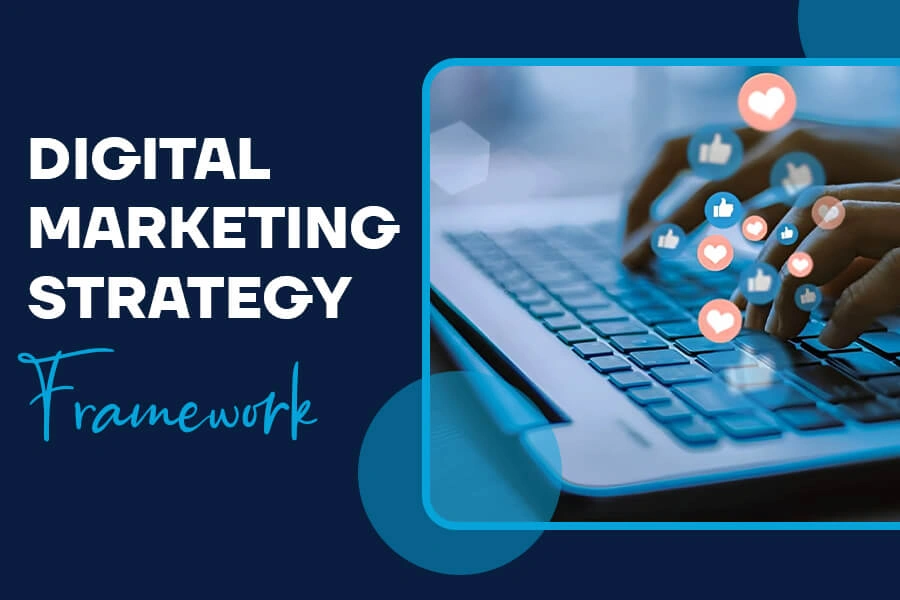
Digital Marketing Strategy Framework The Blueprint for Success
In today’s fast-paced digital landscape, businesses cannot afford to operate without a well-defined digital marketing strategy framework. This structured approach ensures that marketing efforts are streamlined, measurable, and aligned with organizational goals. In this comprehensive guide, we’ll explore how to build a digital marketing plan, what are the strategies of digital marketing, and the various marketing models and frameworks that can drive growth.

What is a Digital Marketing Strategy Framework?
A digital marketing strategy framework acts as a blueprint that guides a company’s online marketing efforts. It provides a structured methodology to identify target audiences.
Set measurable goals.Allocate resources effectively.
Execute and optimize campaigns.
By adopting a structured framework, businesses can avoid the pitfalls of haphazard marketing efforts and focus on delivering consistent value to their audience.
Core Components of a Digital Marketing Plan
Building an effective digital marketing plan requires careful consideration of several core components:
- Goal Setting: Define clear, specific, and measurable objectives. Use the SMART criteria (specific, measurable, achievable, relevant, and time-bound) to ensure goals are actionable.
- Audience Analysis: Understand your audience through market research, surveys, and data analytics. Identify demographic details, preferences, and behaviors to create customer personas.
- Competitor Analysis: Evaluate competitors’ strategies to identify opportunities and gaps. Tools like SWOT analysis (Strengths, Weaknesses, Opportunities, Threats) can help in this process.
- Marketing Channels: Select the most effective digital marketing channels based on your audience and goals. Common channels include SEO, social media, email marketing, and paid advertising.
- Content Strategy: Develop a content calendar that aligns with your brand message and audience interests. Incorporate blogs, videos, infographics, and other formats to engage your audience.
Performance Metrics: Determine key performance indicators (KPIs) such as website traffic, conversion rates, and ROI to measure campaign success.
What Are the Strategies of Digital Marketing?
Digital marketing strategies vary widely depending on the industry, target audience, and business goals. However, some universally effective strategies include:
- Search Engine Optimization (SEO): Optimize your website and content to rank higher in search engine results pages (SERPs). Focus on both on-page and off-page SEO tactics to improve visibility.
- Content Marketing: Create and distribute valuable, relevant content to attract and retain a clearly defined audience. This strategy builds trust and establishes authority in your niche.
- Social Media Marketing: leverage platforms like Facebook, Instagram, LinkedIn, and Twitter to engage with your audience and promote your brand.
- Pay-Per-Click Advertising (PPC): Use paid ads on search engines and social media to drive targeted traffic to your website.
- Email Marketing: Build an email list and nurture leads with personalized, automated email campaigns.
- Affiliate Marketing: Partner with affiliates to promote your products or services in exchange for a commission.
- Influencer Marketing: Collaborate with influencers in your industry to reach their audience and enhance brand credibility.
Popular Marketing Models and Frameworks
Several marketing models and frameworks can be incorporated into your digital marketing strategy to ensure effectiveness:
AIDA Model: This classic model outlines the stages of a customer journey:
Attention: Capture the audience’s attention.
Interest: Generate interest in your product or service.
Desire: Create a strong desire to purchase.
Action: Drive the customer to take action.
STP Framework
Segmentation: Divide your audience into distinct groups.
Targeting: Choose which segments to focus on.
Positioning: Develop a unique value proposition for each target segment.
RACE Framework
Reach: Increase brand awareness.
Act: Encourage engagement.
Convert: Drive conversions.
Engage: Build long-term relationships.
PESTLE Analysis:
Analyze external factors (Political, Economic, Social, Technological, Legal, Environmental) that can impact your marketing strategy.
How to Implement Your Digital Marketing Framework
To successfully implement your digital marketing framework, follow these steps:
- Define Your Vision and Mission:Ensure your marketing goals align with your overall business objectives. Clearly articulate your brand’s mission and vision.
- Assemble a Skilled Team:Build a team with expertise in SEO, content creation, social media management, and data analytics.
- Leverage Technology:Use tools like Google Analytics, HubSpot, and SEMrush to streamline processes and gain insights into campaign performance.
- Test and Optimize:Conduct A/B testing to determine what works best. Continuously optimize campaigns based on data-driven insights.
- Monitor and Report:Regularly track KPIs and prepare reports to assess the effectiveness of your strategy. Use insights to refine future campaigns.
What Are Digital Marketing Strategies for Specific Goals?
To achieve specific objectives, tailor your digital marketing strategies as follows:
- Brand Awareness: Focus on social media marketing, influencer collaborations, and content marketing.
- Lead Generation: Use SEO, PPC campaigns, and gated content like eBooks and webinars.
- Customer Retention: Leverage email marketing, loyalty programs, and personalized offers.
- Sales Growth: Combine retargeting ads with email campaigns and conversion rate optimization (CRO).
Conclusion
A well-defined digital marketing strategy framework is essential for navigating the complexities of the online world. By understanding what are the strategies of digital marketing, leveraging proven marketing models, and tailoring your approach to your unique goals, you can achieve sustainable growth and success. Remember, digital marketing is an evolving field—stay adaptable and continue refining your strategies to stay ahead of the competition.
With years of experience, our digital marketers smart, data-driven strategies and creative solutions, grounded in a deep understanding of shifting online trends. We focus on making your brand feel authentic and memorable in today’s fast-paced digital world.
Let's Talk
(+92) 310 799 0605
info@amigositsystems.com
2nd Floor Ismail's Garments Near Town Hall 64200
Frequently Asked Questions (FAQs)
A digital marketing strategy framework is a structured scheme that explains how a business will use digital channels to achieve its marketing goals. This is necessary because it aligns all online efforts – from SEO to social media – continuity, to maximize ROI and keep your team focused on the average objectives.
The main components usually include:
• Viewers Research
• Target Determination (Smart Target)
• Channel Selection (SEO, PPC, Email, etc.)
• Material strategy
• Budget allocation
• Analytics and KPI
Each part plays an important role in guiding the campaigns and monitoring success.
Use the smart target method: The target must be specific, average, obtainable, relevant and periodically. For example, instead of “website increase traffic”, a target for “25% increase in organic website traffic in 3 months”. Explicit goals guide decision making and performance tracking.
Evaluate where your viewers spend their time and what kind of material they connect with. For B2B, focus on linkedIn and email marketing; For B2C, leverage Instagram, Facebook and paid search. Framework ensures that the channel selection is powered by strategy, not estimates.
Without measurement, you cannot know what is working. Use tools such as Google Analytics, Search Console and CRM dashboard to track KPI. Review the results regularly and optimize on the basis of performance-this continuous response loop is the key to long-term success.



